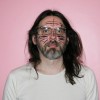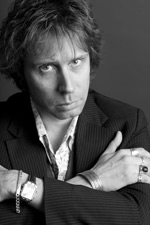John Doe Records and Books, in the 300-block of Warren Street in Hudson, is pretty hard to miss. A former service station, its parking lot is now an obstacle course of rust-covered file cabinets and paint-peeling bookcases, tables, chests of drawers, and other antique furniture for sale. Inside the 1950s brick building’s front room are a couple racks of chicly garish vintage clothing. Beyond, in the back rooms and the adjacent wide-open garage, is where one finds the advertised goods. Each of the three dusty chambers is a thick jungle of disorganized stacks, boxes, and buckling shelves of old LPs, 45s, magazines, paperbacks, and ephemera, making the site a veritable Tut’s tomb of castoff cultural riches. It’s the kind of place a vinyl and book junkie calls heaven. Somewhere to while away a whole afternoon, getting your fingers dirty unearthing treasures while your groaning, toe-tapping mate, if you have one, gives you the evil eye and goes off to find a latte.
Lording over this vast, beautiful mess is shop owner Dan Seward, a gangly, long-haired slacker whose downward gaze and quiet demeanor have led more than a few to mistake him for a curmudgeon. He’s not. The moment you engage him, you find that he’s happy to offer what he knows about certain items or to make small talk about the weather or the town. “I came to Hudson about five years ago,” he says. “The store used to be across the street, in a basement that I rented for $200 a month. Before I ended up here I had a shop in Pawling for a while, then one in Tivoli, another in Rosendale. Retail’s in my blood, man. And recession or no recession, I’ve never seen so many people buying records—it’s crazy. So it’s going really well.” Apparently it is, as he recently opened an annex down the block and with his partners has plans to open another location, John Doe Jr., in Greenfield, Massachusetts. But retail isn’t all that Seward does. He also fronts a band: the Bunnybrains.
In a pivotal scene of Hesse’s Steppenwolf, the protagonist Harry Haller, in the persona of the title character, is out for a walk when he stumbles upon the Magic Theater, its neon sign bearing the enigmatic legend NOT FOR EVERYBODY. The Bunnybrains are not for everybody. A loose-knit cooperative with Seward as the only constant (its website lists an incredible 65 past and present members) that began in his home state of Connecticut in 1988, the band is a kind of nose-thumbing, willfully tuneless, acid-damaged, psychedelic noise unit very much akin to early Butthole Surfers or San Francisco’s legendary Flipper—not something likely to make the playlist of your local Clear Channel franchise, to be mild. And as portends another enticing sign outside the Magic Theater, one that reads ANARCHIST EVENING ENTERTAINMENT, the Bunnybrains’ squalling, brain-bashing shows are heavy on spectacle—unhinged, shambolic performance art that usually finds the bearded Seward in makeup and a dress and the other members holding forth in animal or wrestler’s costumes, the stage adorned with bizarre props and flashing strobes. Seward, whose stage name is Dan Bunny, has absolutely zip in the way of musical training. “I play guitar or keyboards on some of the songs but I don’t know what I’m doing at all,” explains the 45-year-old. “If someone asked me what a G chord was, I’d have no idea. Most of what we do is made up on the spot, but if I do have some kind of melody or riff I’m thinking of I just kind of hum it to the rest of the band and we work it out. Sure, it’d be great to be more competent, and I guess if I really wanted to learn to play, like, 12-bar blues or some kind of Woodstocky world music, I could. But why? Those bands are fine, but there’s already enough of them around.”
Seward grew up in Danbury, Connecticut, where he learned his day trade by working in record stores and opened for local hardcore bands in the guise of performance artist Eg the Poet, whose act with “musical” accompanist Malcolm Tent proved too punk for the punks. “The scene in Connecticut at that time was all of these really militant straight-edge kids, and they absolutely hated me,” recalls the soft-spoken, dry-humored Seward. “I’d read my poems and throw eggs at them, smear jelly and jam all over myself, pull spaghetti out of my underwear, [pretend to] fuck pizzas and frozen chickens on stage. I thought I invented what I was doing; then I found out about [pioneering performance artists] Karen Finley, Joanna Went, people like that. Years later, I learned that a lot of the kids secretly respected me for being different, but when I was on these bills with [hardcore crew] Youth of Today or whoever, most of the audience just wanted to kill me.”
Nevertheless, at the time Seward actually did have his fans, two of whom were SUNY Purchase students Bob Barrett (aka Bobby Bunny) and Elisa Flynn of garage-synth duo Invaders from Sears. The pair had by then already concocted the Bunnybrains as the name for a theatrical noise/improv side project and invited Seward and Tent to join in time for a gig at Brandeis University in 1988. Before long, the group was playing the Northeast underground circuit and cranking out self-released cassettes and vinyl with individually handmade sleeves in editions of 300 copies or less. A few of these raw scraps of DIY rumpus made their way to the turntable of then Matador Records tastemaker Johan Kugelberg. “I really liked the unpretentious energy of the singles, and I started passing them around the office,” recalls Kugelberg, who has since worked for American Recordings and today writes for garage rock zine Ugly Things.
The other powers at Matador were similarly smitten, and soon the label that has also been home to such influential acts as Pavement, Liz Phair, the John Spencer Blues Explosion, Guided By Voices, and Cat Power was offering the Bunnybrains a deal. “We did one [self-titled 1995 vinyl-only] album with Matador, which came in this pink plastic envelope cover that was really expensive for the label to make, and no one bought it,” Seward says. “[The band was] very much anti-CD back then because we grew up with vinyl and thought ‘these new CD things’ were elitist, so Matador indulged us by doing vinyl only—which now I see as being really stupid because it meant we never got any airplay or reviews. [The label] didn’t ask us to do another record after that, and I don’t really blame them.”
The band continued with an occasionally augmented cast, gigging regionally and releasing more singles on under-the-radar labels until 2002, when Tent, Flynn, and Barrett left the fold, the latter citing the band’s “sell- out” into musical orthodoxy—i.e., playing the odd actual song instead of only freeform noise—as his main reason for quitting (the three later reunited as BunnyBrains 88 and now play under the moniker Ultrabunny). But Seward disputes such accusations and has continued to fly the freak flag, leading varying Bunnybrains lineups (the latest includes co-lead vocalist Jamie Mohr, bassist Jason “Wolfman” Martin, guitarist and keyboardist Ross Goldstein, guitarist Mikey Corcoran, and drummer Joe Terry) and building the band’s underground stature via limited releases of new studio material, as well as “official bootlegs” like 2006’s three-CD Triple Live Mayhem on Belgium’s Audiobot imprint.
What really cemented the group’s legendary indie status, however, were two events: the release of 2004’s career overview Box the Bunny (Narnack Records), a monolithic boxed set containing four CDs and a bonus live DVD that racked up rave coverage in the indie press, and a 2005 national tour supporting freak folk golden boy and devout fan Devendra Banhart. “That tour was really weird, but really cool, too,” says Seward. “Here we were, this band none of Devendra’s fans had ever heard of, looking all crazy and making this really fucked-up noise in front of audiences full of college hippie girls. And we’re sharing Devendra’s big Snoop Dog tour bus. But we actually went over pretty well, which was amazing. I had kids come up to me after we played and thank me, saying, ‘Wow, man, I just came [to the concert] from my really shitty job and the release of seeing you guys really helped me feel better.’”
Besides Banhart, another of the Bunnybrains’ famous fans is acclaimed pop singer and bassist Me’Shell Ndegeocello, who as of late has been collaborating with Seward on a soundscape project. “Being around Dan is experiential and insightful,” she says. “The Bunnybrains are a mind-child that opened the door to my courage.”
This month sees the release of What Makes You Think You Can Save Yourself (from yourself) (Independent), the first full-length CD of new Bunnybrains material in 10 years. Kicking off with the snot-nosed garage anthem “It’ll Be Alright,” the self-financed disc moves to a hilariously whacked reading of the Big Bopper’s “Chantilly Lace” before descending into the usual mind-bending chaos via cuts like “Your Dream Ass Is Mine,” “Suicide,” and “Baby Likes to Rock (in the Country).” “The new album cost us less than $500 to make,” says Seward, beaming. “And it took us about as long to record as it takes to listen to, which I think is perfect, really.” The band has lined up a few shows to promote the album, though this time out Seward’s commitment to his stores precludes any lengthy touring. In addition to opening the Greenfield shop, with the help of investors Seward plans to convert the service station location into a combination farmers market/cafe/jazz club this year while moving all of John Doe’s Hudson operations into its Warren Street annex. It seems that, as in the case of his band, with his business Seward has created a model that against all odds has managed to find success in its own way.
The Bunnybrains, like Steppenwolf’s Magic Theater, hold up a funhouse mirror and invite us to jump inside and be liberated. To quote the book further, “True humor begins when a man ceases to take himself seriously.”








